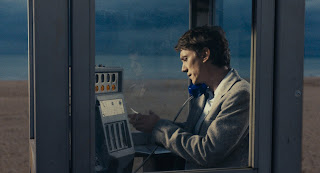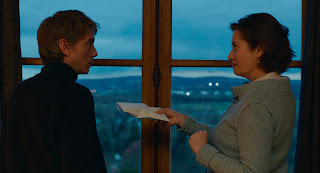The renowned writer Marguerite Duras enjoyed both a successful career and a highly eventful personal life, and it is the latter that forms the focus of Claire Simon's I Want to Talk About Duras. Simon's new film is not concerned with the author's teenage escapades in Indochina—that much-publicised period was covered in Jean-Jacques Annaud's eponymous screen adaptation of Duras' The Lover—but rather examines the relationship between the writer and youthful Breton Yann Andréa, a Duras überfan who, after many years of correspondence, found himself in the rather surreal position of sharing a home and bed with his idol. There was an age gap of nearly half a century between Andréa and Duras, both of whom are now deceased, and their unlikely union could be compared to the one experienced by the title characters in Hal Ashby's Harold and Maude. Simon's film, which screens as part of this year's BFI Flare on March 20 and 22, concentrates on Andréa's 1982 interviews with Marie Claire journalist Michèle Manceaux, during which the subject spoke candidly about his then-ongoing relationship with Duras.
I Want to Talk About Duras isn't the first film on this subject: 2001's Cet amour-là, which starred the legendary Jeanne Moreau as Duras, also set about telling this most atypical of stories; coincidentally, Moreau served as the narrator for The Lover. I Want to Talk About Duras differs from Cet amour-là in a key sense: Duras herself is largely absent from Simon's film, although the author does appear via archive footage that underlines some of the points being made in the interviews. Instead of focusing directly on the author, I Want to Talk About Duras places Swann Arlaud's Andréa and Emmanuelle Devos' Manceaux front and centre, although Duras' presence is still keenly felt; not only is the writer the main topic of discussion, but we can hear her clumping around on another floor of the home she shares with Andréa. What's more, she frequently resorts to a disruptive tactic in the form of calling the telephone which sits just next to her partner. As such, Duras is a ghostly, unnerving presence, one who always seems to be hovering around the edges of the action.
For a film centring on Marguerite Duras to relegate the title character to the periphery seems rather perverse—doubly so when it stars the incomparable Emmanuelle Devos, whose casting here tantalisingly hints at what she could have done if handed the role of Duras (anyone who doubts Devos' suitability for such a part need look no further than her terrific turn as Violette Leduc—another author who was no stranger to scandal—in Martin Provost's excellent biopic Violette). It is to Simon's great credit that I Want to Talk About Duras survives both this daring move and the equally bold stroke of splicing in a sequence from Duras' 1975 film India Song, which practically invites the viewer to think about which film they'd rather be watching. Devos' Michèle Manceaux doesn't have to say a great deal while her tape recorder absorbs Andréa's thoughts on Duras, but there are numerous occasions when the camera remains fixed on her face as she listens intently; Simon clearly understands how best to use Devos' wonderfully expressive features.
Much of what Andréa has to say conjures up a most unflattering picture of Duras, who is painted as a domineering control freak, one who dictates virtually everything in the relationship, ranging from Yann's diet to his sexuality. It's a disturbing arrangement, yet one in which Andréa seems to have found some sort of contentment—even if he fails to truly comprehend the setup's unwholesome nature. With this film, Simon has set herself several stiff challenges—in this sense, it recalls Lars von Trier and Jørgen Leth's The Five Obstructions—but what is perhaps the biggest potential pitfall of all comes in the form of the film being a two-hander, a format which may be fine for the stage yet often founders in the far less forgiving medium of cinema. Simon sidesteps this by opening the film up whenever a flicker of staginess threatens to creep in; in addition to the aforementioned extract from India Song, there's a mesmerising crepuscular scene detailing Mancieux's walk home after a long day of interviewing. Of course, much can be overlooked in a film starring these two fine actors, and Swann Arlaud exudes the same sort of sensitive fragility he channelled so effectively in François Ozon's outstanding By the Grace of God. Despite the myriad obstacles Claire Simon places in her own path, I Want to Talk About Duras is an engaging, invigorating work.
Darren Arnold
Images: BFI





